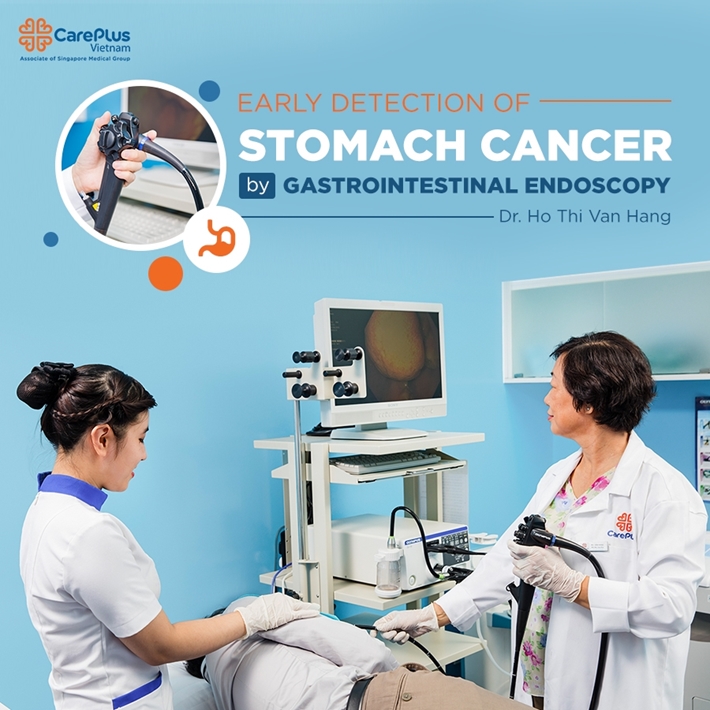Early detection of stomach cancer by gastrointestinal endoscopy

6/2/2021 11:07:00 AM
Stomach cancer is one of the common cancers related to the digestive system in particular and cancer in general today. However, clinical symptoms are often poor, vague, less specific, and progress silently. Therefore, screening and diagnosis of gastric cancer are necessary for timely and effective treatment.
In particular, gastrointestinal endoscopy is a screening method, accurately detecting lesions occurring in the gastrointestinal tract that are difficult to see with other diagnostic procedures. Therefore, gastrointestinal endoscopy plays a vital role in early screening of the risk of gastric cancer.
1. What is gastrointestinal endoscopy?
Gastrointestinal endoscopy is the common name for the endoscopy method of the stomach - duodenum - colon - rectum. It is one of the most modern methods available to help accurately and quickly diagnose diseases related to the digestive tract. In particular, gastrointestinal endoscopy also helps detect dangerous conditions associated with the digestive system, such as rectal cancer, stomach cancer, and duodenal cancer.
2. Current endoscopic methods of GI tract
2.1. Normal gastrointestinal endoscopy
For this procedure, the endoscope will be inserted either from the nose/throat (upper gastrointestinal endoscopy) or through the anus (lower gastrointestinal endoscopy). Gastrointestinal endoscopy is usually applied in cases where the patient is fully awake. Therefore, patients will usually receive no sedation or only local anesthesia.
2.2. Gastrointestinal endoscopy painless
To perform a painless endoscopy, the doctor will insert the endoscope through the nasopharynx or anus when the patient is sedated. The anesthetic process is usually short so that the patient can wake up immediately after the end of the endoscopy procedure.
3. Role of gastrointestinal endoscopy
Stomach cancer screening includes CA72-4 test, Gastroscopy, Gastrointestinal clinical examination, consulting test results, endoscopy.
CA72-4 test:
- CA72-4 test: CA 72-4 is an antigen secreted by cells in the body, especially in the stomach CA72-4 is produced more than other sites. Therefore, when CA 72-4 is elevated, it suggests that more intensive testing is needed to look for stomach cancer.
- CA72-4 is elevated in #60% of stomach cancer cases. CA 72-4 also increases in some other organ cancers such as ovarian cancer, colorectal cancer, other digestive cancers... CA72-4 can be slightly increased in some cases of benign tumors, smokers. Smoking, using stimulants. Thus, high CA72-4 cannot confirm gastric cancer.
- CA72-4 is valuable in evaluating treatment and monitoring recurrence after gastric cancer treatment: After effective treatment, the CA72-4 index gradually returns to normal. However, after treatment, the CA72-4 index increased again is a sign of cancer recurrence (70%).
Currently, gastrointestinal endoscopy is a method to help doctors effectively diagnose diseases in the upper part of the digestive tract (stomach, esophagus, duodenum), the lower part of the digestive tract (rectum, colon, anus). For example, upper gastrointestinal endoscopy (with a flexible fiberscope from the esophagus to the first part of the small intestine: duodenum D1-2) is the gold standard for diagnosis (and early diagnosis) esophageal cancer, cancer, stomach by:
Popularity: Currently, endoscopes are quite popularly equipped from the level of general clinics to hospitals. The technique is fast and less complicated (especially endoscopic with anesthesia).
Through endoscopy, tissue samples were taken for testing for HP bacteria, histopathology (most important for diagnosing cancer), treatment interventions such as esophageal dilation, esophageal stenting to treat narrowing, hemostasis injection, sclerotherapy injection, polypectomy, mucosal resection for early cancer treatment.
4. Who need a screening for Esophageal, Stomach Cancer:
- People with elevated CA72-4.
- People with family history: father/mother/sibling with cancer of the esophagus, stomach.
- People with anemia have not identified the cause.
- People with symptoms of bloating / loss of appetite / persistent nausea / unexplained weight loss.
- People with continuous choking with/without weight loss.
- People with vomiting blood / Black stools.